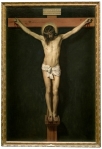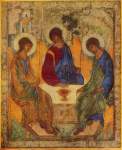
Let us pray:
Almighty God, who through your only-begotten Son Jesus Christ overcame death and opened to us the gate of everlasting life: Grant that we, who celebrate with joy the day of the Lord’s resurrection, may be raised from the death of sin by your life-giving Spirit; through Jesus Christ our Lord, who lives and reigns with you and the Holy Spirit, one God, now and for ever. Amen.
“Fear not, for behold I bring you good tidings of great joy” Words we were hearing only a few months ago at the celebration of Christmas, rejoicing that Jesus the Christ, Immanuel God with us, was born. It was the greatest news those shepherds ever heard, and probably told everyone they knew. And it started with “Fear not”. Such a strange phrase to accompany such joyous life-changing news.
And here it is again: an angel appears telling the women at the tomb “Do not be afraid”. Why should they be afraid? What is there to fear about Easter? Let’s take a closer look and see what we find.
It was at dawn on the first day of the week. Btw if you’ve ever wondered why we gather for worship on Sunday mornings, this is why: we gather in the same way the women did, to remember and celebrate that Christ rose from the grave on a Sunday morning. Every Sunday is a mini-Easter for us, remembering Christ’s resurrection.
So the women, after having rested on the Sabbath, come to the tomb to grieve and worship the one they followed all the way to his death. The one who saved them and gave them a new life, now lays dead in a tomb of stone after being tortured, humiliated, and executed. But the women still love him and seek to honor him even now in his death.
Yet upon their arrival at the tomb, something miraculous happens! An angel of the Lord came down from heaven at that moment, and his arrival caused an earthquake to happen right there at the tomb. Just as an earthquake happened on Friday at the death of Jesus, now comes another to signal something world changing and supernatural is happening. Prophets and psalm writers and even Jesus himself proclaimed storms and earthquakes as signs of the end of the age, and it seems that’s what is happening right here in our text: it is the ending of an age.
Then the angel rolls away the stone that probably took many strong soldiers to secure in place, along with the official seal of Rome that this tomb was to remain closed. Yet the angel single-handedly removes the seal, removes the barrier, then sits on top of the stone as a sign of triumph over the grave and Rome’s attempt to hold Jesus in.
The soliders who were on guard there witnessed all of this and in terror of what happened fell down like dead men. How ironic that the ones who were alive guarding a dead man are now acting dead in defeat, showing that even all the might and power of Rome is nothing compared to God.
Then the angel speaks to the women: “Don’t be afraid. I know that you are looking for Jesus who was crucified.” He tells them to not be scared, which is a little ridiculous given everything they just witnessed. An angel shining in brilliant white light, accompanied by an earthquake, removing a stone that weighed many tons and making professional elite soldiers play dead. Any of us would be terrified too!
Yet he seeks to comfort them, and tells them “I know why you’re here” which is also slightly unsettling. Then the angel says the most shocking, remarkable thing; a word that would change all of history: “He isn’t here, because he’s been raised from the dead, just as he said. Come, see the place where they laid him.” Wait, he isn’t here? But you just removed the stone? And you’re saying he’s alive? How?! How did he get out?! How did he come back to life?! I mean, he mentioned being handed over to death and coming back to life a few times but you’re saying that really happened?!
Have you ever heard such good news that it was difficult, if not impossible, to believe? A debt being canceled, a gift given that’s more generous than anything you’ve received or given before, an act of forgiveness you were convinced would never come. It’s difficult, maybe even painful, to receive such good news when it’s unexpected. But that doesn’t change the fact that the news is good. No matter if we are afraid, joyous, distant, or whatever the news is still good news. And this just happens to be good news for everyone, for all people and all creation.
And it is good news for a few reasons.
One reason is because in the 1st century Jewish mindset, resurrection was an event that God would do at the end of all time. The faithful would be brought back to eternal life to live forever in paradise with God and all would be recreated as it should have been all along. This was the hope they had to look forward to, at least those Jews who believed in resurrection (some like the Sadducees didn’t due to a strict adherence to only the 5 books of Torah, that’s why they are Sad you see). But to those who did believe, that was to occur at the end of time in the future. Jesus rising from the grave here and now, which only the Father could do, means that resurrection and the breaking in of the kingdom is now!
God is doing a new work NOW!
God is bringing the kingdom of heaven to earth NOW!
New creation is happening and Jesus is as Paul says the firstborn among the dead ushering in this new age. This is glorious news because we no longer have to wait for God to do a new good work later in the future, because God is already at work recreating and new creating here and now! We’ll talk about this more in a few weeks as we come to Pentecost, but that’s good news and reason to celebrate!
Here’s another reason this is good news: Christ has conquered death and grave, and now he is lord over not just all of life but over death as well. And if Jesus has conquered death and brought life out of the grave, we who are his followers no longer need to fear death. What would a people who aren’t afraid of death look like? What will they act like and live like? If you weren’t afraid to die, what would be different in your life?
In dying, Christ has brought death and the grave under his dominion. In rising, Christ has brought life and resurrection power to all who truly believe that he is the crucified and risen Messiah for all people. In three days time, Jesus has changed everything about how we understand not just death but living, truly living.
So why does that make us afraid? Why do we need to be told “fear not” when we hear this news? Many might say to live without fear of death is radical, not realistic, even absurd by some. Living without fear means we would not just see our lives differently but we would see others all around us differently. We would no longer see people as “them”, “those people”, or even “our enemies”; we would see people as those loved by God who are brothers and sisters. We would no longer be bound by fear of losing what we possess and hold dear because now not even death can separate us from God and life eternal. And sin no longer has dominion over us because Christ has shed his blood and broken the power of sin in the world so that we no longer have to be in bondage under the brokenness of sin. And especially for us as Nazarenes coming from the Methodist/Wesleyan tradition, we believe the love and grace and power of God to always be stronger than sin, that we might be sanctified so purely and perfectly by God’s love that sin no longer has any place in our lives.
And that’s scary for many people, because it changes everything we ever thought was true and real in the world. And change is scary, even good beautiful liberating change. God shows us on this Easter day everything is different and we are invited to join in this resurrection life, not just when we die and go to heaven but right here right now. And if we do that we will look different from the world around us. We will be weirdos, Jesus freaks, oddballs in society. Yet this is the way of God, the way Jesus told us about and demonstrated with his life, the way things were always meant to be, and by God’s grace the way things can and will be again.







